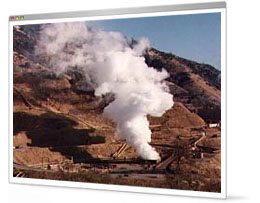My UPD8
You need to login before you download the free activities. You can register here.
- The Centre for Science Education
- The Association for Science Education
- Partners
- Part of ASE online
Hot Rocks

Type: Activity
Learning Strategy: Scientific writing
Topic: Generating electricity
Africa's Rift Valley straddles a constructive plate margin. Magma welling up from below provides a massive reservoir of heat energy, and Kenyan's are beginning to exploit its potential. Geothermal energy is powering homes and running the greenhouses that grow roses for UK florists. Students consider why the geology of the area makes this possible, and how geothermal power stations might affect local communities.
Published: 4th May 2005
Reviews & Comments: 1
Learning objectives
Students will gain a basic understanding of the geology that makes a location suitable for a geothermal power plant, and address potential concerns of the local community.
Try the activity
- Teachers Guide
Downloaded: 2596 times - Activity sheet
Downloaded: 4330 times
You will need Acrobat Reader installed to open the activity sheets.
Curriculum link
Energy resources [QCA 7I]• How renewable energy resources can be used to generate electricity
The rock cycle [QCA 8H]
• Igneous rocks crystallise from magma
• High pressure and temperature changes rocks into different types of rocks
• Evidence for rocks melting
Running the activity
Page 1 sets the scene and gives the information needed to complete the activity. Page 2 puts students in charge of public relations for the new power station. They need to answer the public's questions and reassure them about impact the station will have on the area. Some students might use the information to design a poster for display in the local town, or develop a script for a radio broadcast.
Suggested answers
• Will it be dangerous? It shouldn't be – no more dangerous than the active volcano nearby. That could erupt at any time. But you obviously have to keep the steam you bring up under control.
• How will it benefit my family? The drilling, and making the power station, are expensive. But then the steam that powers the generators is free. So the electricity will be cheap.
• Will it pollute the atmosphere? No: the main gas produced is steam.
• Will the supply be reliable? Very reliable – the hot rock is always there. The water is recycled, so we won't have power cuts every time there's a drought.
• Will it affect wildlife? It's unlikely to affect wildlife because the power station is quite small. The animals won't take any notice of it.
• Will it put off tourists who come here on Safari? Possibly – but the power station will only take up a small area, so we don't need to worry about them spoiling the view.
Web links
News links
- BBC
- This is an introduction to the news story, with some detail about how the electricity generated is used.
- Press release
- A useful summary.
- Geothermal Power
- This is a very useful general website about geothermal energy.
Reviews & Comments
Write your online review to share your feedback and classroom tips with other teachers. How well does it work, how engaging is it, how did you use it, and how could it be improved?
Variation (female chimps learning survival skills faster
Feb 24th, 2008

was a good activity and focused on environmental variation. however information was too much for the lower ability set. Also having information on 3 seperate sheets was also confusing.
Reviewer: Susan Ajetunmobi

200 lessons and assessments from as little as £4.95
Related Activities
Physics / Generating electricity
Earth Science / Plate tectonics
Difficult & Dull / Rocks
QCA / 8H The rock cycle
Ideas about Science / Communicating science
- Emergency
- Time raiders - death of a mummy
- Instant ice-cream
- Green Biker
- Food for Thought
- Garbage Gurus
- Backstage science
- Speedy sperm
- Ellen's moments
- Mite Attack
- The Day After Tomorrow
- Journey to the Centre of the Earth
- Stardust
- Pompeii: the movie
- Can Science catch a bomber?
- In the limelight
- Think big
- Attack of the giant viruses
- Eat insects
- Appliance science